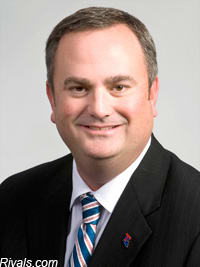Coaches: NCAA should spring back to old rule


Advertisement
Dallas JacksonClick MORE: Rivals Camp Series presented by Under ArmourHere to view this Link. is the National Columnist for Rivals.com. Email him your comments or story ideas to DallasJ@Yahoo-Inc.comClick MORE: Rivals Camp Series presented by Under ArmourHere to view this Link. and follow him on TwitterClick MORE: Rivals Camp Series presented by Under ArmourHere to view this Link..
For college football recruiting, it may be time to turn back the clock in an effort to move forward.
It has been five years since the NCAA enacted a rule that all but ended the spring evaluation period for football coaches. Now -- like then -- the rule does not make sense, and as the recruiting process evolves the time has come to change it back.
Dave Doeren was the defensive coordinator at Wisconsin when the rule was changed in 2008. Now the head coach of N.C. State, he says he is one of those who wants it to be repealed.
"I understand why they changed it with all the 'bumping' that would go on, but being able to see the kids compete would be really helpful," Doeren said.
"I'd be all for the NCAA going back and allowing those spring evaluations."
Previously, head coaches and assistants would hit the road from April 15 through the end of May, traveling the county to attend camps that were designed to give prospects exposure and have them compete in front of similarly talented players.
The problem the NCAA saw was that coaches would "bump" into players and make illegal contact; instead of finding ways around that issue, the rule to eliminate the potential violation was made.
At the time, the rule was widely viewed as one to prevent aggressive recruiters such as Nick Saban, Urban Meyer and Pete Carroll from gaining an edge on coaches who were not as active in the process. That is a problem that has since worked to cure itself because of the universal attention paid to recruiting.
Today, the rule allows for one phone call to players and one evaluation of athletic ability during the spring before the prospective student-athlete's senior season.
Rivals.com national recruiting analyst Mike Farrell said that the current legislation is antiquated and unneeded, at best.
"At the time, the NCAA was under the impression that they could control the recruiting process and then went in and made a bunch of rules that weren't necessary," he said. "Now they are at the point that they are shrugging their shoulders and acknowledging they cannot.
"What the NCAA didn't want was 7-on-7s or spring camps to turn into the AAU, so they took events off of campus and ensured that the balance of power was not placed in the hands of springtime coaches or people who could be looked at as runners."
Farrell said that now is the time to go back to what it once was.
"It would really cut down on a lot of the wear and tear on college coaches to have it eliminated," he said. "Now those guys are going to schools one by one and checking in on kids, but the only evaluation they get on some players is usually against his own teammates who aren't as good as the player they are there to see most of the time."
Events such as the Rivals Camp Series presented by Under Armour could provide a proving ground for players and a one-stop shop for the coaches.
The way it stands now, many programs are waiting to see video and written analysis of prospects from the spring events posted on the Internet.
A change to allow them back on the field would help staffs, evaluators and kids.
"I know for our analysts we have a list of guys we want to see at every camp we attend, but we always find a few who stand out and get attention," Farrell said. "I think that it would benefit under-the-radar kids and underclassmen to get noticed.
"I also think that it would bring the best out of everyone. No one would be dogging it if there were coaches there to see it. No one would come up with a mysterious family emergency or have a last-minute injury."
California coach Sonny Dykes said the NCAA going back and forth on many rules has made for more confusion; it also has caused more headaches for his staff.
"Recruiting gets so much attention and the NCAA thinks that it is trying to simplify things and close loopholes, but it has continued to open new ones," Dykes said. "That makes things tough."
Farrell said policing the situation has become, more or less, the honor system among coaches.
The winter dead period has coincided with the Under Armour All-America Game and the U.S. Army All-American Bowl. The two evenings create a merging point at which many assistant coaches make legal contact with players in the hotel lobby -- and maintain a professional decorum that each member manages.
"The two are really no different," Farrell said. "The lobby and the spring evaluations would be completely public forums, and if there are a hundred coaches in one place you would have to openly break the rule in front of your peers.
"It is not a perfect system, but it would be a major risk to do something in front of someone who could easily report you."
As the Rivals Camp Series concludes with its June finale -- the Rivals100 Five-Star Challenge presented by Under Armour -- which will play host to 80 rising seniors and 20 of the best underclassmen in the country at Soldier Field in Chicago, Farrell said he wonders what more it would be if properly legislated.
"There would be a billion assistants there, self policing, and seeing the best kids," Farrell said. "I don't know why they changed the rule, but it is time to go back."

Click Here to view this Link.
[rl]